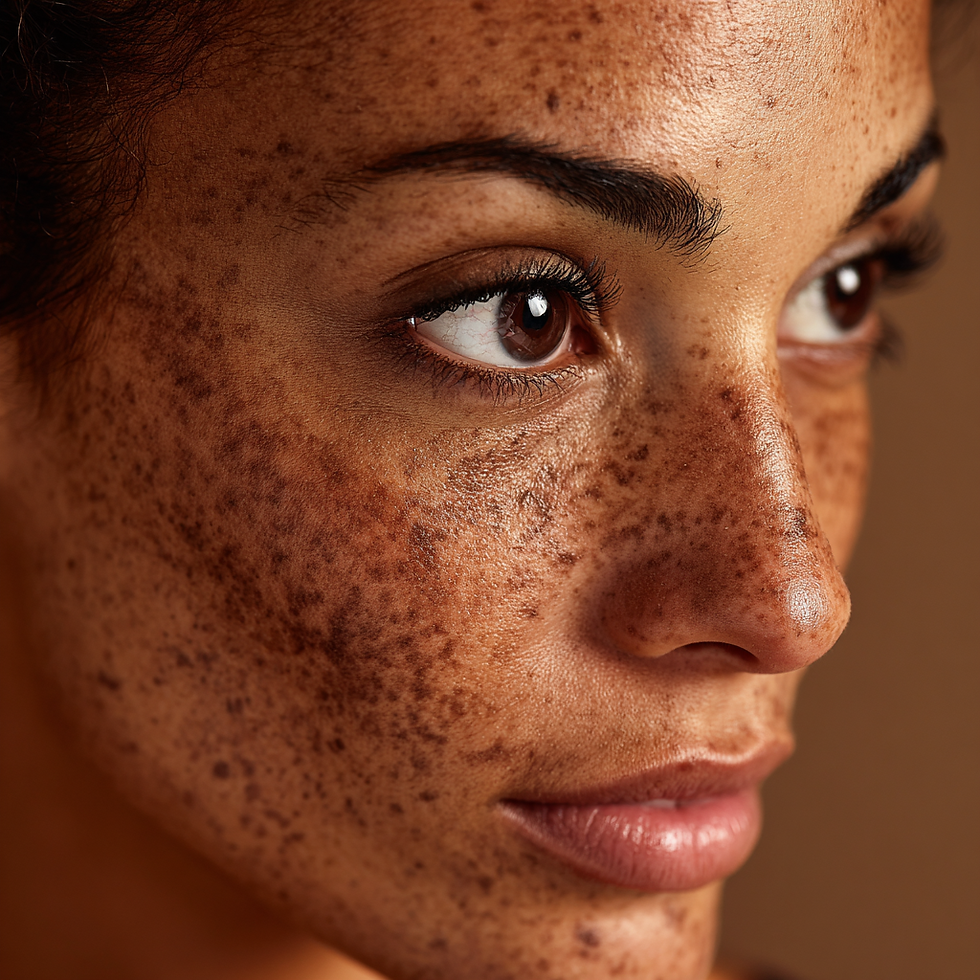How to Treat Pigmentation: Expert Tips for Radiant Skin
- Aug 14, 2025
- 6 min read

Pigmentation can be frustrating. If dark spots, uneven skin tone, or stubborn freckles bother you, you're not alone. Millions of people currently experience pigmentation issues, and achieving clear skin can be very challenging.
But there are some proven ways to address these concerns and achieve the complexion you desire. Here, we are going to explore those ways to treat skin pigmentation. So let's get started!
What Is Pigmentation?
Understanding pigmentation is the first step in effective treatment. Pigmentation is your skin's coloring, primarily caused by melanin. Melanin gives your skin, eyes, and hair their color. However, uneven or overactive melanin production leads to various pigmentation concerns. For example, some skin pigmentation disorders, like albinism, are genetic.
"Pigmentation refers to the coloring of your skin, which is primarily caused by melanin—the pigment that gives your skin, eyes, and hair their color. Pigmentation concerns occur when there's an overproduction or underproduction of melanin, leading to dark spots, uneven skin tone, or freckles."
Common Pigmentation Issues Include:
Dark spots and patches
Melasma
Freckles and sunspots
Post-inflammatory hyperpigmentation (PIH)
Vitiligo or hypopigmented patches
Types of Pigmentation and Their Causes
Before discussing treatment, understanding different pigmentation types and causes is crucial. This knowledge helps you choose the most effective treatment.
1. Hyperpigmentation

What It Is: Hyperpigmentation occurs when the skin produces excess melanin, resulting in dark spots or patches. These spots can appear on the face, arms, or other areas of the body exposed to the sun.
Causes: Sun exposure, acne scarring, hormonal changes (such as during pregnancy), and post-inflammatory hyperpigmentation (PIH) from cuts or breakouts.
How to Address It: Use brightening products with ingredients like Vitamin C, retinol, and niacinamide to lighten dark spots.
2. Hypopigmentation

What It Is: Hypopigmentation occurs when there's a decrease in melanin production, leading to lighter patches on the skin. This is less common but can be just as concerning for those affected.
Causes: Skin conditions like vitiligo, eczema, or sunburn can cause a decrease in melanin.
How to Address It: Treatment may involve light therapies or creams that encourage melanin production, but in some cases, seeing a dermatologist is recommended.
3. Freckles and Sun Spots

What They Are: Freckles are small, flat, brown spots that usually appear on the face, arms, and other areas exposed to the sun. Sunspots, also called age spots or liver spots, are larger and more prominent than freckles.
Causes: Both are primarily caused by excessive sun exposure, which triggers the production of melanin in certain spots.
How to Address It: Use sunscreen consistently and look for brightening creams with SPF to prevent further pigmentation. You can also explore treatments like chemical peels or laser therapy to target stubborn sunspots.
Best Skincare Ingredients for Treating Pigmentation
Numerous options exist for treating pigmentation, ranging from over-the-counter products to professional treatments. There are also a few home remedies that may be effective. Many people use aloe vera to help treat their pigmentation. Harvard Health recommends green tea extract but says more clinical trials are needed.
1. Vitamin C
Known for its brightening and antioxidant properties, Vitamin C is a must-have for fading dark spots and evening-out skin tone.
How It Works: It inhibits melanin production, helping to lighten dark spots and brighten the skin.
Recommended Product: SkinCeuticals C E Ferulic – A potent Vitamin C serum that works wonders on pigmentation.
2. Retinol
A derivative of Vitamin A, retinol is one of the most powerful ingredients for treating pigmentation concerns, especially those caused by acne scarring or sun damage.
How It Works: Retinol speeds up skin cell turnover, helping to fade dark spots and promote the growth of new, even-toned skin.
Recommended Product: The Ordinary Retinol 0.5% in Squalane – An affordable option that tackles pigmentation over time.
3. Niacinamide
This ingredient is a game-changer for treating pigmentation because it's gentle yet effective.
How It Works: Niacinamide helps lighten dark spots, reduces redness, and evens out skin tone without irritating the skin.
Recommended Product: Paula's Choice 10% Niacinamide Booster – Helps to reduce pigmentation while boosting skin health.
4. Alpha Arbutin
Alpha Arbutin is a gentle, natural ingredient known for reducing the appearance of dark spots and pigmentation.
How It Works: It lightens dark spots by inhibiting melanin production and brightening the overall complexion.
Recommended Product: The Ordinary Alpha Arbutin 2% + HA – A powerful formula that targets pigmentation and brightens the skin.
5. Sunscreen (SPF 30 or Higher)
Sunscreen is the number one product for preventing further pigmentation and protecting your skin from harmful UV rays that can worsen pigmentation.
How It Works: Regular sunscreen use prevents UV rays from darkening existing spots and protects your skin from further damage.
Recommended Product: La Roche-Posay Anthelios Melt-in Sunscreen Milk SPF 60 – A broad-spectrum sunscreen that helps protect against UV-induced pigmentation.
Professional Treatments: When You Need Extra Power
Professional treatments offer intensive solutions for stubborn pigmentation. These skin conditions may not respond to home remedies. These treatment options should only be done under the care of a qualified medical professional.
Chemical Peels: Revealing Fresh Skin
Chemical peels involve applying a chemical solution (usually an acid) to your skin to exfoliate the surface layers. This helps to remove damaged skin and encourages the growth of new, healthy skin cells. They're especially useful for treating pigmentation caused by sun damage, melasma, or post-inflammatory hyperpigmentation (PIH).
The chemical peel works by dissolving dead skin cells and speeding up the turnover of new skin cells. There are different strengths of chemical peels—ranging from light to deep—and each can target specific skin concerns.
Laser Therapy: Targeting Pigment at Its Source
Laser therapy uses concentrated light to target and break down excess melanin (pigment) in your skin. Different types of lasers work in various ways to address pigmentation. Lasers emit specific wavelengths of light that are absorbed by the pigment in the skin, breaking it down into smaller particles that your body can then remove naturally. Some lasers target the surface layers to exfoliate and fade dark spots, while others penetrate deeper layers to treat more stubborn pigmentation issues.
Microneedling: Stimulating Skin Renewal
Microneedling, also known as collagen induction therapy, involves using a device with fine needles to create tiny punctures in the skin. These micro-injuries stimulate your skin's natural healing process and boost collagen and elastin production.
The tiny punctures created during microneedling trigger the body's healing response, leading to new, healthier skin cells and the production of collagen and elastin. When combined with topical treatments like Vitamin C or hyaluronic acid, microneedling helps those ingredients penetrate deeper into the skin for better results. Microneedling is particularly beneficial for treating acne scars and other types of hyperpigmentation.
Lifestyle Changes: Supporting Your Pigmentation Treatment
Lifestyle changes significantly enhance treatment results and prevent future issues. This can improve visible light and help the treatment work even better.
Sun Protection: Your Daily Must-Do
Sun exposure is the primary cause of pigmentation. Daily broad-spectrum sunscreen with at least SPF 30 is crucial. Reapply every two hours, especially outdoors. Studies show regular sunscreen prevents new pigmentation and improves existing discoloration.
Diet: Nourishing Your Skin from Within
An antioxidant-rich diet protects against free radical damage contributing to pigmentation. Foods with vitamins C, E, and omega-3 fatty acids are especially beneficial. Green tea extract and oral tranexamic acid are recommended, with more research needed.
Stress Management: Keeping Your Hormones in Check
Stress doesn't just affect your mental health—it can also affect your skin. When you're stressed, your body produces hormones like cortisol, which can trigger an inflammatory response and increase oil production in the skin. This can lead to breakouts, but more importantly, stress hormones can exacerbate pigmentation issues like melasma, which is often triggered or worsened by hormonal changes.
The MirrorMate Advantage: Personalized Pigmentation Solutions

While understanding pigmentation treatment is vital, personalized advice makes a difference. MirrorMate app offers precisely that. This AI-powered app provides instant, personalized skin analysis and treatment recommendations.
Instant Analysis: Get skin condition feedback in 20 seconds.
Personalized Recommendations: Receive tailored advice for your pigmentation concerns.
Progress Tracking: Monitor your treatment effectiveness.
Expert Insights: Access professional knowledge about treating pigmentation.
MirrorMate combines technology with dermatological expertise, offering a unique advantage in achieving clearer skin.
Conclusion
Pigmentation concerns can be frustrating, but with the right approach, you can reduce dark spots, brighten your complexion, and even out your skin tone. Whether through targeted treatments like Vitamin C or retinol or by following a consistent skincare routine, the key is to stay patient and consistent.
Learning how to treat pigmentation effectively can significantly impact your skin and confidence. You now have the knowledge to improve your skin's appearance. You have many treatment options.
Consistency is key in treating pigmentation. Whether using topical treatments, professional procedures, or making lifestyle changes, allow time for your skin to respond.
For personalized treatment, consider MirrorMate App (iOS | Android). Its AI analysis and tailored recommendations could be the solution for you. If you don't know which products are best for treating pigmentation, you can also try the Forever Beauty App (iOS | Android), which offers personalized product recommendations according to your skin.
.png)




Comments